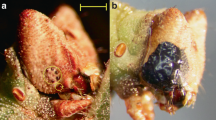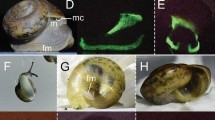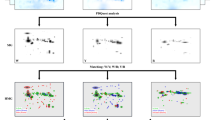Abstract
THE demonstration by Perkins1 that colour changes in Palæmonetes vulgaris were controlled by a hormone that originated in the eye-stalks has since been confirmed and extended by a number of investigators (see Hänstrom's2 review). Gamble and Keeble3 in their classic study of colour changes in Hippolyte were the first to describe a diurnal rhythm which persisted under constant environmental conditions. Within the past five years, several papers on persisting diurnal rhythms in the pigmentary system of crustaceans have appeared. The two English investigators interpreted the phenomena of crustacean metachrosis, according to the view of chromatophoral activity prevalent at that time, as being dependent upon the nervous system. We reinvestigated the colour changes of Hippolyte to see whether the endocrinal control similar to that found in other crustaceans was present.
This is a preview of subscription content, access via your institution
Access options
Subscribe to this journal
Receive 51 print issues and online access
$199.00 per year
only $3.90 per issue
Buy this article
- Purchase on Springer Link
- Instant access to full article PDF
Prices may be subject to local taxes which are calculated during checkout
Similar content being viewed by others
References
J. Exp. Zool, 50 (1928).
Ergeb. Biol., 14 (1937).
Quart. J. Micro. Sci., 43 (1900).
Author information
Authors and Affiliations
Rights and permissions
About this article
Cite this article
KLEINHOLZ, L., WELSH, J. Colour Changes in Hippolyte varians. Nature 140, 851–852 (1937). https://doi.org/10.1038/140851b0
Issue Date:
DOI: https://doi.org/10.1038/140851b0
This article is cited by
-
Colour change and behavioural choice facilitate chameleon prawn camouflage against different seaweed backgrounds
Communications Biology (2019)
-
The colour change of the zoea of the shrimp, crangon crangon L.
Experientia (1953)
Comments
By submitting a comment you agree to abide by our Terms and Community Guidelines. If you find something abusive or that does not comply with our terms or guidelines please flag it as inappropriate.



